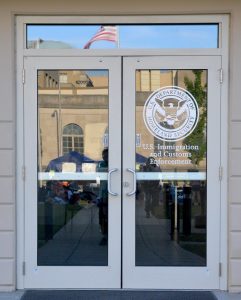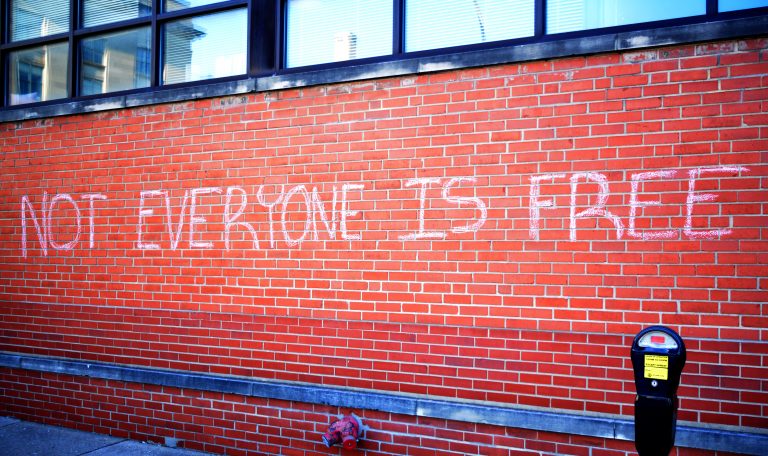No names mentioned here. The state of our union is such that the people who stand up for what’s right have to protect themselves from identification by those who would harass and even harm them for speaking. This is America, 2018.
“I’ve been here five days, and nobody’s even said the name Trump,” he said, as we looked out over the small encampment in the heart of downtown Louisville. “This is really bigger than one man, and it’s been going on for longer than one administration, or one policy. This is about decency, and human dignity.”
I guarantee the people coming in the morning wouldn’t buy a word of that.
The signs are familiar, the usual themes of peace and humanity – the power of love overcoming the love of power – the normal entreaties to act as if people of a different skin color are also human. This time it’s nationality. Sometimes it’s race, other times it’s gender or sexual orientation, but the one that always catches my eye is the ever-present, “I can’t believe that we’re still arguing about this in 2018.”
This camp is well-organized. A food tent was well-stocked with enough supplies to sustain the small camp for the long haul. A game tent to entertain the protesters through the long, hot wait for justice. Groups of young people sat on the sidewalk, some playing Uno, some reading, others distributing water and fresh fruit. A schedule board is propped against the legs of an awning, delineating times for what I’d call Resistance Education, classes in Nonviolent Resistance, Passive Self-Defense, De-escalating Conflict, taught by the more experienced in peaceful demonstration tactics. The thermometer at the base reads 108F. They’re going through hundreds of pounds of ice, but it regenerates due to a stream of benefactors who come and go, not able to stay, but wanting to contribute just the same.
The leaders are low-key, but I know who they are because I’ve seen them before. Resistance is organized at a certain level in Louisville. There are plenty of volunteers, people who simply show up for justice, but there are some who train for this. People who educate themselves to be able to teach. People who train as street medics and protest communications, liaisons between protesters and law enforcement, and people who study the rules of demonstration to ensure that these events never run afoul of the law. They’ve learned their lesson from history – breaking the law invites the police to end your demonstration, and confrontation with counter-protesters gets people hurt, people sued, and costs them the moral high ground upon which their message depends.
My camera and I are welcome because they know me. They want to be welcoming, but this is America in 2018, and unknown white men with cameras might be Proud Boys, or worse, alt-right spies looking to dox them to other, more violent types. I’m known, but even then, my street medic friend advises that if anyone questions me, I’m to drop her name. She’s ever-present, her life dedicated to social justice.
This is life in an encampment on a sidewalk in downtown Louisville, between the hulking granite Federal Courthouse and the Immigration and Customs Enforcement office. There are armed guards in the ICE Building, watching through the glass doors, occasionally emerging to shout at children for venturing too far up the walk to draw with sidewalk chalk, or to confront protesters who look too long at the building. Lord knows there are armed men in the Federal Courthouse building, but it’s across the street, and they’re keeping to themselves. Occasionally, Metro Police will cruise by, but as long as the peace is kept, they don’t stop.

There is some suspicion of the police, but I remember an experience of my own some years ago, an encounter with the Westboro Baptist Church in my neighborhood. We’re lucky in Louisville – the police surely have their own opinion, but they generally don’t let it affect how they do business, at least not when this many white people are involved. I remember them knowing who I was, before I even arrived, and the Scene Commander approaching me and calling me by name. They monitor social media – another reason there are no names in this column. They’re there to keep Louisville out of the news, no more, no less.
The suspicion today comes from a flyer that’s been circulating, instructions to the counter-protesters about where to park, and where they’ll be allowed to stand. To the inexperienced, it looks as if the LMPD are helping the counter-protesters get their act together, describing where there is free parking, and where there is gathering space. The veterans of these sorts of things know that the recommended parking area is well away from the encampment parking, and that the counter-protesters will be made to stand well away, with a buffer zone preventing physical contact. Any encroachment of that buffer zone will be dealt with by the police, equitably. The police aren’t there to help either side, right or wrong. But why would the encampment trust them? This is America in 2018, where we see police violence daily, often aimed at peaceful protesters.
It’s a recipe for disaster. In the morning, there will presumably be hundreds of angry white men across the street, and they’re expected to bring guns. It’s an open-carry state. Emotions are high. There will be chanting and signs and those men with guns honestly believe that they’re Freedom Fighters defending America against some insidious force of liberalism and culture erasure. My safety won’t be guaranteed either – these men have been led to fervently believe that the media is part of the problem, and my camera, which is often a powerful credential, might be a target. This is America, 2018, where people shoot at journalists.
There aren’t any real plans in the camp. They’re there, they’re not leaving, and they have every right to be there, to feel the way they do, and to expect a redress of their grievances from a government of, by and for the people. But the question in the air is still existential – if the other side doesn’t believe you should have those rights, do you really have them? Rights are a weird thing – there’s not much redress once they’re already violated. They depend on the mutual respect of all, that all people are deserving of the rights of mankind. It’s hard to believe that rights are going to protect you when the very debate in question is about who is entitled to those rights. It’s not a huge leap from ‘they don’t deserve the same rights as us’ to ‘you’re standing up for them, so you don’t deserve those rights either.’ Respect for human rights, and for human dignity, seems in short supply on the other side, especially when they’re opposing you for speaking out for another person’s dignity.
Does it really matter if we punish a man for violating someone’s rights if someone is hurt or killed in the process of exercising them? A little late, if you ask me. But that’s America in 2018.
Freedom is dangerous. And photographers tell the truth. Someone needs to tell the truth. My hope is that the honesty of the lens is a deterrent to the worst – nobody wants to be immortalized doing violent, awful things, no matter how fervently they believe in their motives.
I’m not afraid, but I’d bet the people in the encampment aren’t getting much sleep tonight. This is life in an Occupy ICE camp, over a thousand miles from any border. This is life in America in 2018, where people fear for their lives while exercising their right to speak freely.
